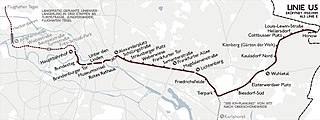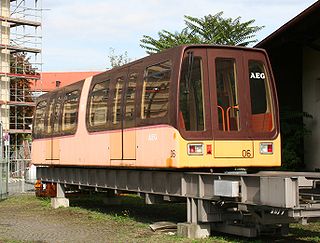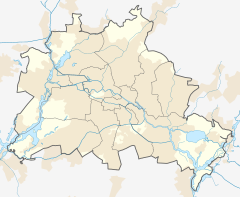
U5 is a line on the Berlin U-Bahn. It runs from Hauptbahnhof in Mitte eastwards through Alexanderplatz, Friedrichshain, Lichtenberg and Friedrichsfelde, surfaces in Biesdorf-Süd to pass Kaulsdorf and Hellersdorf above ground and finally reaches city limits at Hönow.

Siemensdamm is a station on the Berlin U-Bahn line U7, located in the Spandau district. It was opened on 1 October 1980 with the line's extension from Richard-Wagner-Platz to Rohrdamm. The station is named after an arterial street, which itself is named after Werner von Siemens. The company he founded, Siemens AG, has many facilities in the station's surroundings.

Halemweg is a station on the Berlin U-Bahn line U7, located in the Charlottenburg-Nord district. It was opened on 1 October 1980 with the line's extension from Richard-Wagner-Platz to Rohrdamm. The eponymous neighborhood street is named after Resistance fighter Nikolaus von Halem, who was executed in Brandenburg-Görden Prison on 9 October 1944. The next station is Jakob-Kaiser-Platz.

The M-Bahn or Magnetbahn was an elevated Maglev train line operating in Berlin, Germany, experimentally from 1984 and in passenger operation from 1989 to 1991. The line was 1.6 kilometres (1 mi) in length, and featured three stations, two of which were newly constructed. Presumed to be the future of rail transit in Berlin, the line was built to fill a gap in the West Berlin public transport network created by the construction of the Berlin Wall. It was rendered redundant by the reunification of Berlin and was closed to enable reconstruction of the U2 line.

Podbielskiallee is an underground railway station in the German capital city of Berlin. It is part of the Berlin U-Bahn network and located in the Dahlem district on the line.

Kurt-Schumacher-Platz is a station on the line of the Berlin U-Bahn. There had been a bus link outside the station connecting Berlin's Tegel International Airport to the U-Bahn network. The station was opened on 3 May 1956 and named after famous German politician Kurt Schumacher.

Hellersdorf is a locality in the borough of Marzahn-Hellersdorf in Berlin. Between 1986 and Berlin's 2001 administrative reform, it was a borough in its own right, consisting of the current area of Hellersdorf as well as Kaulsdorf and Mahlsdorf.

Biesdorf-Süd is a surface level Berlin U-Bahn station located on the line of the U-Bahn Berlin subway in the neighborhood of Biesdorf in Berlin, Germany. The station opened on 1 July, 1988. After Tierpark, It comes above ground. The next station is Elsterwerdaer Platz. North of the U-Bahn station is the Biesdorfer Baggersee.

Wuhletal is a railway station in the Marzahn-Hellersdorf district of Berlin. It is served by the S-Bahn line and the U-Bahn line .

Cottbusser Platz is a Berlin U-Bahn station located in the borough Marzahn-Hellersdorf on the line.

Louis-Lewin-Straße is a surface level Berlin U-Bahn station in the German capital city of Berlin. It is part of the Berlin U-Bahn; the station is located on the line.

Hönow is a Berlin U-Bahn station and the eastern terminus of the line. Located at the borders of the Berliner ward of Hellersdorf, the station borders Hönow, a village of the Hoppegarten municipality in the state of Brandenburg.

Birkenstraße is a Berlin U-Bahn station located on the line. It was opened in 1961 by B. Grimmek. There are two entrances to the station, located at the Birkenstraße and Wilhelmshavenerstraße crossroad, on either side of the road. The station's walls are decorated with green tiles in reference to the station's name—the word birke is German for birch tree.

Berlin Rathaus Steglitz is the name of both a railway station on the Wannsee Railway and a U-Bahn station in the district of Steglitz in Berlin, Germany, which are close together. It is served by the Berlin S-Bahn, Berlin U-Bahn and numerous local bus lines.

Hoppegarten is a municipality in the district Märkisch-Oderland, in Brandenburg, Germany.

Kaulsdorf is a locality within the borough Marzahn-Hellersdorf of Berlin. Kaulsdorf was incorporated into Greater Berlin by the Prussian Greater Berlin Act in 1920. From then on it belonged to the former borough of Lichtenberg until 1979, when it became part of the then borough of Marzahn. In 1986 Marzahn's eastern areas, including Kaulsdorf, were separated to form the new Borough of Hellerdorf, which was merged in 2001 to form the current borough. Kaulsdorf has, as of 2006, a population of 18,822 and encompasses an area of 8,7 km².

Biesdorf is a railway station in the Marzahn-Hellersdorf district of Berlin. It is served by the S-Bahn line .

Kaulsdorf is a railway station in the Marzahn-Hellersdorf district of Berlin. It is served by the S-Bahn line .

Berlin-Mahlsdorf is a railway station in the Marzahn-Hellersdorf district of Berlin. It is served by the S-Bahn line .

Bus transport is the oldest public transport service in Berlin, the capital city of Germany, having been introduced in 1846. Since 1929, services have been operated by the Berlin Transport Company, although during the Cold War-era division of the city they operated in West Berlin only. BVG's fleet consists of 1,300 vehicles, which cover 300,000 kilometres per day.

![]() line.
line.



















